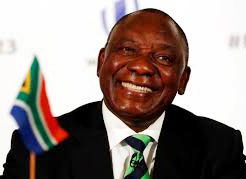South African President Cyril Ramaphosa’s future hangs in the balance as political vultures hover over his head, eagerly waiting to pounce once he is ensnared by the several traps laid in his path.
The South African leader, who benefitted from the fall from grace of his predecessor Jacob Zuma in 2018, ironically finds himself on the receiving end of the same ruling African National Congress (ANC) factional politics that pushed out his former boss – and the one before him, Thabo Mbeki.
The factional battles are playing out on several fronts – all aimed at either pushing Ramaphosa out before the ANC’s national elective conference set for December or tarnishing his reputation so that he is unelectable at the year-end conference.
In the latest such battle, Zuma loyalists wrestled the ANC’s largest province from pro-Ramaphosa officials at the ANC’s KwaZulu-Natal provincial elective conference that ended at the weekend.
This was a major setback for Ramaphosa and his allies desperately wanted to retain control of the province and weaken the influence of the corruption-accused Zuma in the governance of the ANC and the country.
Cognisant of the odds that were stacked against him, Ramaphosa initially refused to close Saturday’s closing ceremony of the KwaZulu-Natal provincial conference fearing that he would be booed by the delegates.
He had a late change of mind, agreeing to address the conference – ostensibly at the insistency of his advisers who felt that avoiding the meeting would be seen as a sign of weakness and admission of defeat in a province that accounts for about 30 percent of South Africa’s 61 million-plus population.
The victory by Zuma loyalists set the scene for a potential bruising showdown between Ramaphosa and his ANC opponents at the party’s year-end national elective conference.
The South African leader has been criticised for his failing to address the country’s economic and social challenges since coming to power nearly four years ago.
Pro-Zuma elements are expected to hype on Ramaphosa’s alleged failure to rid the country of corruption and high crime rate.
Ramaphosa’s hand in the fight against corruption has been weakened by the recent allegations that he sought to cover up a robbery at his farm in Limpopo province where thieves went away with more than US$4 million that was stashed there.
The robbery came to light in June when former State Security Agency chief Arthur Fraser opened a criminal case against Ramaphosa and the head of the Presidential Protection Service, Wally Rhoode, for hiding the crime from the police.
Media reports at the weekend said Rhoode implicated Ramaphosa and his Namibian counterpart Hage Geingob in alleged attempts to conceal the crime.
The Sunday Independent reported that Rhoode “opened a can of worms” during an inquiry by suspended Public Protector Busisiwe Mkhwebane by revealing that he was ordered by Ramaphosa to clandestinely handle the robbery issue and that Geingob was aware of what was happening, including the alleged kidnapping of the suspects.
Ramaphosa’s opponents are also expected to crucify the president for failure to address poor service delivery, including rolling power outages that have rocked the country in recent months.
Former president Mbeki last week lambasted Ramaphosa’s government for not having a plan to resolve the crises facing the country.
Addressing the memorial service for the late ANC deputy secretary general Jessie Duarte, Mbeki said there was “no national plan to challenges of poverty, unemployment, (and) inequality.”
JN/APA


